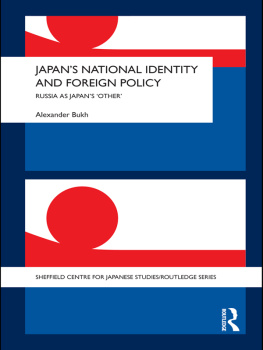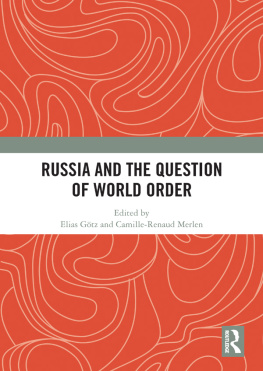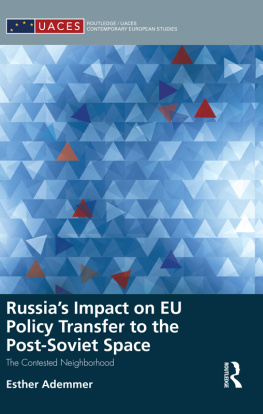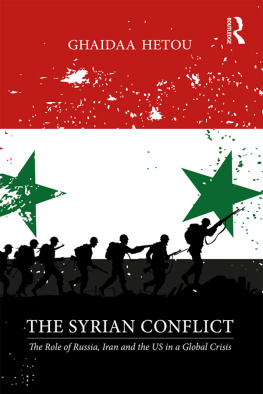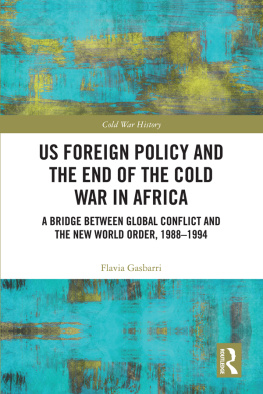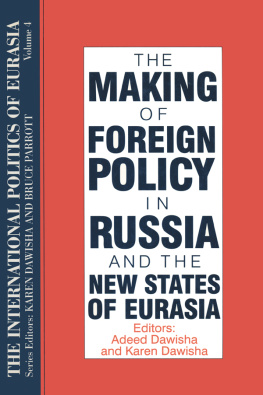With the collapse of the old ideological paradigms at the end of the Cold war, new ideas are required to understand how we ended up in new era of confrontation and renewed Russo-American Cold War. This ground-breaking study examines how the ideational legacies of the original Cold War shape the new conflict. This sophisticated and erudite study is essential reading for anyone trying to make sense of it all.
Professor Richard Sakwa, University of Kent, UK
Focusing on Cold War legacies and mindsets, David Parker provides a compelling account of USRussia interactions following American decisions to expand NATO, promote democracy, and negotiate the START agreement. The Cold War may be over, but its ideational legacy lives on and contributes to shaping policy.
Professor Andrei P. Tsygankov, International Relations and Political Science,San Francisco State University, US
David Parkers explanation of how ideational legacies formed out of the experiences of elites and policy-makers in the Cold War have shaped US attitudes and actions towards Russia since it ended is a distinctive and valuable contribution. It has great historical and contemporary relevance, given the downward trajectory of USRussia relations in the last decade.
Dr Nicolas Bouchet, German Marshall Fund of the United States, US
US Foreign Policy Towards Russia in the Post-Cold War Era
This book discusses how the ideas, expectations and mind-sets that formed within different US foreign policy making institutions during the Cold War have continued to influence US foreign policy making vis--vis Russia in the post-Cold War era, with detrimental consequences for USRussia relations. It analyses what these ideas, expectations and mind-sets are, explores how they have influenced US foreign policy towards Russia as ideational legacies, including the ideas that Russia is untrustworthy, has to be contained and that in some aspects the relationship is necessarily adversarial, and outlines the consequences for USRussian relations. It considers these ideational legacies in depth in relation to NATO enlargement, democracy promotion, and arms control and sets the subject in its wider context where other factors, such as increasingly assertive Russian foreign policy, impact on the relationship. It concludes by demonstrating how tension and mistrust have continued to grow during the Trump administration and considers the future for USRussian relations.
David Parker is a Marie-Curie Research Fellow in the Department of Political Science at Aarhus University, Denmark and a Visiting Research Fellow in the Department of War Studies at Kings College London, UK.
BASEES/Routledge Series on Russian and East European Studies
Series editors:
Sociology and anthropology: Judith Pallot (President of BASEES and Chair), University of Oxford
Economics and business: Richard Connolly, University of Birmingham
Media and cultural studies: Birgit Beumers, University of Aberystwyth
Politics and international relations: Andrew Wilson, School of Slavonic and East European Studies, University College London
History: Matt Rendle, University of Exeter
This series is published on behalf of BASEES (the British Association for Slavonic and East European Studies). The series comprises original, high-quality, research-level work by both new and established scholars on all aspects of Russian, Soviet, post-Soviet and East European Studies in humanities and social science subjects.
Belarus under Lukashenka
Adaptive Authoritarianism
Matthew Frear
Class Cultures in Post-Socialist Eastern Europe
Draen Cepi
Belarus Alternative Visions
Nation, Memory and Cosmopolitanism
Simon Lewis
Russian Culture in the Age of Globalization
Edited by Vlad Strukov and Sarah Hudspith
Security, Society and the State in the Caucasus
Edited by Kevork Oskanian and Derek Averre
Memory, the City and the Legacy of World War II in East Central Europe
The Ghosts of Others
Uilleam Blacker
US Foreign Policy Towards Russia in the Post-Cold War Era
Ideational Legacies and Institutionalised Conflict and Co-operation
David Parker
For a full list of available titles please visit: www.routledge.com/BASEES-Routledge-Series-on-Russian-and-East-European-Studies/book-series/BASEES
First published 2019
by Routledge
2 Park Square, Milton Park, Abingdon, Oxon OX14 4RN
and by Routledge
52 Vanderbilt Avenue, New York, NY 10017
Routledge is an imprint of the Taylor & Francis Group, an informa business
2019 David Parker
The right of David Parker to be identified as author of this work has been asserted by him in accordance with sections 77 and 78 of the Copyright, Designs and Patents Act 1988.
All rights reserved. No part of this book may be reprinted or reproduced or utilised in any form or by any electronic, mechanical, or other means, now known or hereafter invented, including photocopying and recording, or in any information storage or retrieval system, without permission in writing from the publishers.
Trademark notice: Product or corporate names may be trademarks or registered trademarks, and are used only for identification and explanation without intent to infringe.
British Library Cataloguing-in-Publication Data
A catalogue record for this book is available from the British Library
Library of Congress Cataloging-in-Publication Data
Names: Parker, David (David John), author.
Title: US foreign policy towards Russia in the post-Cold War era : ideational legacies and institutionalised conflict and co-operation / David Parker.
Other titles: United States policy towards Russia in the post-Cold War era
Description: First edition. | London ; New York, NY : Routledge/Taylor & Francis Group, 2019. | Series: BASEES/Routledge series on Russian and East European Studies ; 130 | Includes bibliographical references and index.
Identifiers: LCCN 2019016079| ISBN 9781138321397 (hardback) | ISBN 9780429452550 (ebk) | ISBN 9780429840050 (Adobe reader) | ISBN 9780429840036 (mobipocket) | ISBN 9780429840043 (epub3)
Subjects: LCSH: United StatesForeign relationsRussia (Federation) | Russia (Federation)Foreign relationsUnited States. | United States Foreign relations1989 | Cold WarInfluence. | National securityUnited States.
Classification: LCC E183.8.R9 P335 2019 | DDC 327.73047086dc23
LC record available at https://lccn.loc.gov/2019016079
ISBN: 978-1-138-32139-7 (hbk)
ISBN: 978-0-429-45255-0 (ebk)
Typeset in Times New Roman
by Wearset Ltd, Boldon, Tyne and Wear



